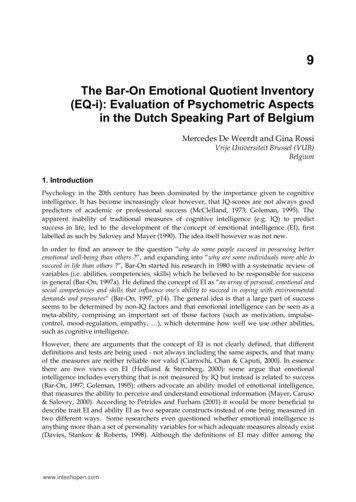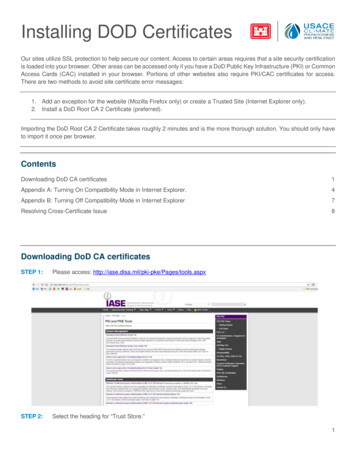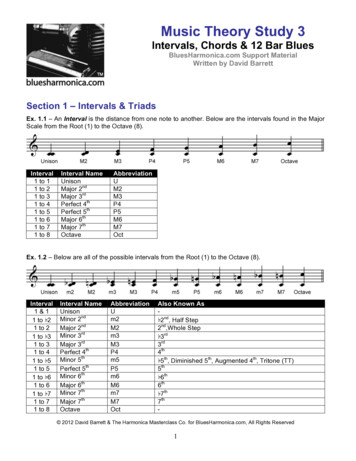
Transcription
T H E S TAT E B A R O F CA L I F O R N I ADO INEEDESTATEPLANNING?EHTT LEG GALE CTSF A LIFEOF
Do I needestateplanning?1What is estate planning?2What is involved in estate planning?3Who needs estate planning?4What is included in my estate?5What is a will?6What is a revocable living trust?7What is probate?8Can I name alternative beneficiaries?9Who should be my executor or trustee?10How should I provide for my minor children?11Will my beneficiaries’ inheritance be taxed?12Does the way in which I hold title makea difference?13Are there other ways of leaving property?14What happens if I become unable to care for myself?1516Who should help me with my estate planningdocuments?Should I beware of “promoters” of financial andestate planning services?17How much does estate planning cost?18How do I find a qualified lawyer? 1983, 1992, 1998, 2002, 2005, 2007, 2010, 2011 The State Bar of California.No part of this work may be reproduced, stored in a retrieval system, ortransmitted in any medium, without prior written permission.This pamphlet was made possible, in part, through the volunteer efforts of theTrusts and Estates Section of the State Bar of California.
1 What is estate planning?Estate planning is a process. It involves people—your family, other individuals and, in many cases,charitable organizations of your choice. It alsoinvolves your assets (your property) and the variousforms of ownership and title that those assets maytake. And it addresses your future needs in case youever become unable to care for yourself.Through estate planning, you can determine: How and by whom your assets will be man-aged for your benefit during your lifetime if youever become unable to manage them yourself. When and under what circumstances it makessense to distribute your assets during your lifetime. How and to whom your assets will be dis-tributed after your death. How and by whom your personal care willbe managed and how health care decisions will bemade during your lifetime if you become unable tocare for yourself.Many people mistakenly think that estateplanning only involves the writing of a will. Estateplanning, however, can also involve financial, tax,medical and business planning. A will is part ofthe planning process, but you will need otherdocuments as well to fully address your estateplanning needs.The purpose of this pamphlet is to summarize the estate planning process, and illustratehow it can help you meet your goals and objectives. You will discover that estate planningis a dynamic process. Just as people and assetsand laws change, it may well be necessary toadjust your estate plan every so often to reflectthose changes.1
2 What is involved in estateplanning?There are many issues to consider in creating anestate plan. First of all, ask yourself the followingquestions: What are my assets and what is theirapproximate value? Whom do I want to receive those assets—and when? Who should manage those assets if I can-not—either during my lifetime or after my death? Who should be responsible for taking care ofmy minor children if I become unable to care forthem myself? Who should make decisions on my behalfconcerning my care and welfare if I become unableto care for myself? What do I want done with my remains afterI die and where would I want them buried, scattered or otherwise laid to rest?Once you have some answers to these questions, you are ready to seek the advice and servicesof a qualified lawyer (see #18). Such a lawyer canhelp you create an estate plan, and advise you onsuch issues as taxes, title to assets and the management of your estate.3 Who needs estate planning?You do—whether your estate is large or small.Either way, you should designate someone tomanage your assets and make health care and personal care decisions for you if you ever becomeunable to do so for yourself.If your estate is small, you may simply focus2
on who will receive your assets after your death,and who should manage your estate, pay your lastdebts and handle the distribution of your assets. Ifyour estate is large, your lawyer will also discussvarious ways of preserving your assets for yourbeneficiaries and of reducing or postponing theamount of estate tax which otherwise might bepayable after your death.If you fail to plan ahead, a judge will simplyappoint someone to handle your assets and personal care. And your assets will be distributed toyour heirs according to a set of rules known asintestate succession. Contrary to popular myth,everything does not automatically go to the stateif you die without a will. Your relatives, no matter how remote, and, in some cases, the relativesof your spouse will have priority in inheritanceahead of the state. Still, they may not be yourchoice of heirs; an estate plan gives you muchgreater control over who will inherit your assetsafter your death.4 What is included in my estate?All of your assets. This could include assets heldin your name alone or jointly with others, assetssuch as bank accounts, real estate, stocks and bonds,and furniture, cars and jewelry. Your assets may alsoinclude life insurance proceeds, retirement accountsand payments that are due to you (such as a taxrefund, outstanding loan or inheritance).The value of your estate is equal to the “fairmarket value” of all of your various types ofproperty—after you have deducted your debts(your car loan, for example, and any mortgageon your home).The value of your estate is important indetermining whether your estate will be subjectto estate taxes after your death (see #11) andwhether your beneficiaries could later be subjectto capital gains taxes. Ensuring that there will besufficient resources to pay such taxes is anotherimportant part of the estate planning process.3
5 What is a will?A will is a traditional legal document which: Names individuals (or charitable organiza-tions) who will receive your assets after yourdeath, either by outright gift or in a trust. Nominates an executor who will be appointedand supervised by the probate court to manage yourestate; pay your debts, expenses and taxes; and distribute your estate according to the instructions inyour will. Nominates guardians for your minorchildren.Most assets in your name alone at your deathwill be subject to your will. Some exceptionsinclude securities accounts and bank accounts thathave designated beneficiaries, life insurance policies, IRAs and other tax-deferred retirement plans,and some annuities. Such assets would pass directlyto the beneficiaries and would not be included inyour will (see #13).In addition, certain co-owned assets (see #12)would pass directly to the surviving co-ownerregardless of any instructions in your will. Andassets that have been transferred to a revocableliving trust (see #6) would be distributed throughthe trust—not your will.For some, a California Statutory Will (a fill-inthe-blanks form) may be sufficient. This formcan be printed out from the State Bar website atcalbar.ca.gov (go to Will Form under Quicklinks).Keep in mind, however, that you must executeyour will in the manner required by Californialaw. Failure to do so could invalidate the entire will.You should discuss such requirements with aqualified lawyer.For more information, order a free copy of theState Bar pamphlet entitled Do I Need a Will? (Forinformation on ordering this pamphlet, see #18.)4
6 What is a revocable living trust?It is a legal document that can, in some cases,partially substitute for a will. With a revocable livingtrust (also known as a revocable inter vivos trust orgrantor trust), your assets are put into the trust,administered for your benefit during your lifetimeand transferred to your beneficiaries when youdie—all without the need for court involvement.Most people name themselves as the trustee incharge of managing their living trust’s assets. Bynaming yourself as trustee, you can remain in control of the assets during your lifetime. In addition,you can revoke or change any terms of the trust atany time as long as you are still competent. (Theterms of the trust become irrevocable when you die.)In your trust agreement, you will also name asuccessor trustee (a person or institution) who willtake over as the trustee and manage the trust’s assetsif you should ever become unable to do so. Yoursuccessor trustee would also take over the management and distribution of your assets when you die.A living trust does not, however, remove allneed for a will. Generally, you would still need awill—known as a pour over will—to cover anyassets that have not been transferred to the trust.You should consult with a qualified estateplanning lawyer to assist you in the preparation ofa living trust, your will and other estate planningdocuments. Also, keep in mind that your choice oftrustees is extremely important. That trustee’smanagement of your living trust assets will not beautomatically subject to direct court supervision.For more detailed information, see the StateBar pamphlet Do I Need a Living Trust? (See #18for pamphlet ordering information.)7 What is probate?Probate is a court-supervised process fortransferring a deceased person’s assets to thebeneficiaries listed in his or her will. Typically,the executor named in your will would start the5
process after your death by filing a petition incourt and seeking appointment. Your executorwould then take charge of your assets, pay yourdebts and, after receiving court approval, distribute the rest of your estate to your beneficiaries. Ifyou were to die intestate (that is, without a will),a relative or other interested person could startthe process. In such an instance, the court wouldappoint an administrator to handle your estate.Personal representative is another term used todescribe the administrator or executor appointedto handle an estate.Simpler procedures are available for transferringproperty to a spouse or for handling estates in whichthe total assets amount to less than 100,000.The probate process has advantages and disadvantages. The probate court is accustomed toresolving disputes about the distribution of assetsfairly quickly through a process with definedrules. In addition, the probate court reviews thepersonal representative’s handling of each estate,which can help protect the beneficiaries’ interests.One disadvantage, however, is that probatesare public. Your estate plan and the value of yourassets will become a public record. Also, becauselawyer’s fees and executor’s commissions arebased on a statutory fee schedule, a probate maycost more than the management and distributionof a comparable estate under a living trust. Timecan be a factor as well. A probate proceedinggenerally takes longer than the administration ofa living trust. Discuss such advantages and disadvantages with an estate planning lawyerbefore making any decisions.8 Can I name alternativebeneficiaries?Yes. You should consider alternative beneficiaries in the event that your primary beneficiarydoes not survive you.And if a beneficiary is too young or too disabledto handle an inheritance, you might consider setting6
up a trust for his or her benefit under your will orliving trust.Once you have decided who should receiveyour assets, it is very important that you correctlyidentify those chosen individuals and charitableorganizations in your will or trust. Many organizations have similar names and, in some families,individuals have similar or even identical names.An estate planning lawyer can help you clarifyand appropriately identify your beneficiaries.9 Who should be my executoror trustee?That is your decision. You could name yourspouse or domestic partner as your executor ortrustee. Or you might choose an adult child,another relative, a family friend, a business associate or a professional fiduciary such as a bank.Your executor or trustee does not need any special training. What is most important is that yourchosen executor or trustee is organized, prudent,responsible and honest.While the executor of a will is subject to directcourt supervision and the trustee of a living trustis not, they serve almost identical functions. Bothare responsible for ensuring that your writteninstructions are followed.One difference is that the trustee of your livingtrust may assume responsibilities under the trustagreement while you are still living (if you everbecome unable or unwilling to continue serving astrustee yourself).Discuss your choice of an executor or trusteewith your estate planning lawyer. There are manyissues to consider. For example, will the appointment of one of your adult children hurt his or herrelationship with any other siblings? What conflictsof interest would be created if you name a businessassociate or partner as your executor or trustee?And will the person named as executor or successor trustee have the time, organizational ability andexperience to do the job effectively?7
10 How should I provide for myminor children?First of all, in your will, you should nominatea guardian to supervise and care for your child(and to manage the child’s assets) until he or sheis 18 years old. Under California law, a minorchild (a child under age 18) would not be legallyqualified to care for himself or herself if bothparents were to die. Nor is a minor legally qualified to manage his or her own property. Yournomination of a guardian could avoid a “tug ofwar” between well-meaning family membersand others.You also might consider transferring assets toa custodian account under the California UniformTransfers to Minors Act to be held for the childuntil he or she reaches age 18, 21 or 25. Or youmight consider setting up a trust to be held,administered and distributed for the child’sbenefit until the child is even older.11 Will my beneficiaries’ inheritancebe taxed?It depends on the circumstances. Assets leftto your spouse (if he or she is a U.S. citizen) orany charitable organization will not be subject toestate tax. Assets left to anyone else—even yourchildren—will be taxed if that portion of theestate totals more than 5 million. In 2013, unlessCongress changes the law, the exemption willdrop to 1 million. For estates that approach orexceed these amounts, significant estate taxes canbe saved by proper estate planning before yourdeath or, for couples, before one of you dies.In addition, while you are living, you cangive away as much as 13,000 a year to each ofyour children or to anyone else without incurringgift tax. You could also pay your grandchild’s college tuition or medical insurance premiums (oranyone’s tuition or medical bills, for that matter)free of gift tax—but only if the payments are8
made directly to the educational institution ormedical provider.Keep in mind that tax laws often change.And estate planning for tax purposes must takeinto account not only estate and gift taxes, butalso income, capital gains, property and generation-skipping taxes as well. Qualified legaladvice about taxes and current tax law should beobtained from a competent lawyer during theestate planning process.12 Does the way in which I hold titlemake a difference?Yes. The nature of your assets and how youhold title to those assets is a critical factor in theestate planning process. Before you take title (orchange title) to an asset, you should understandthe tax and other consequences of any proposedchange. Your estate planning lawyer will be ableto advise you. Community property and separate property.If you are married or a registered domestic partner, assets earned by either you or your spouseor domestic partner while married or in the partnership and while a resident of California arecommunity property. (Note: Earned income indomestic partnerships, however, may not betreated as community property for federalincome tax purposes.)As a married individual or registered domestic partner, you may continue to own certain separate property as well—property which you ownedprior to the marriage or domestic partnership. Agift or inheritance received during the marriageor partnership would be considered separateproperty as well.Separate property can be converted tocommunity property (and vice versa) by a written agreement (it must conform with Californialaw) signed by both spouses. However, takingsuch a step can have significant tax and other9
consequences. Make sure that you understandsuch consequences before making any suchchange. Tenants-in-common. If you own property astenants in common and one co-tenant (co-owner)dies, that co-tenant’s interest in the propertywould pass to the beneficiary named in his or herwill. This would apply to co-tenants who are married or in a domestic partnership as well as tothose who are single. Joint tenancy with right of survivorship.Co-owners (married or not) of a property canalso hold title as joint tenants with right of survivorship. If one tenant were to die in such a situation, the property would simply pass to the surviving joint tenant without being affected by thedeceased person’s will. Community property with right ofsurvivorship. If you are married or in a registered domestic partnership, you and your spouseor partner could also hold title to property ascommunity property with right of survivorship.Then, if your spouse or domestic partner were todie, the property would pass to you withoutbeing affected by the deceased person’s will.Married couples and registered domestic partners also have the option of jointly holding title toproperty as community property. In such a situation,if one spouse or partner were to die, his or herinterest would be distributed according to theinstructions in his or her will.13 Are there other ways of leavingproperty?Yes. Certain kinds of assets are transferreddirectly to the named beneficiaries. Such assetsinclude: Life insurance proceeds.10
Qualified or non-qualified retirement plans,including 401(k) plans and IRAs. Certain “trustee” bank accounts. Transfer on death (or TOD) securitiesaccounts. Pay on death (or POD) assets, a common titleon U.S. savings bonds.Keep in mind that these beneficiary designations can have significant tax benefits and consequences for your beneficiaries—and must be carefully coordinated with your overall estate plan.14 What happens if I become unableto care for myself?You can help determine what will happenby making your own arrangements in advance.Through estate planning, you can choose thosewho will care for you and your estate if youever become unable to do so for yourself. Justmake sure that your choices are documentedin writing.A power of attorney, for example, is a writtenlegal document that gives another person the rightand authority to act on your behalf. It can be limited to special circumstances or it can be general.That authority will end if you become incapacitated—unless you have a durable power of attorney. Adurable power of attorney will remain in effectwhile you are incapacitated. This means that if youwere suddenly unable to handle your own affairs,someone you trust—your legal agent or attorney-infact—could do so for you.Or you might choose to set up a springingpower of attorney, which would only become effective at a specified future date or event (your loss ofcapacity, for example).You can authorize your agent to simply payyour bills. (This is usually a safer arrangement11
than adding someone else’s name to your bankaccount.) Or you can empower your agent to handle nearly all of your affairs. Your agent, however,cannot take anything of yours as a “gift” withoutyour specific written authorization. These powersof attorney all expire when you die.Make sure that you understand all of the termsbefore signing a power of attorney. And beabsolutely certain that your chosen agent is bothcapable and trustworthy. There are those who havelost their life savings to unscrupulous agents—even to agents who are family members.If you set up a living trust, it is the trustee whowill provide the necessary management of theassets held in trust. In such a case, you might consider setting up a durable power of attorney for property management as well to handle limited financialtransactions and to deal with assets that may nothave been transferred to your living trust.With an advance health care directive, you canalso designate someone to make health care decisions for you in the event that you becomeunable to do so for yourself. In addition, thislegal document can contain your wishes concerning such matters as life-sustaining treatment andother health care issues and instructions concerning organ donation, disposition of remains andyour funeral. (You can revoke the directive at anytime, as long as you are still competent.) Givecopies to your health care agent, alternate agent,doctor, health plan representatives and family.And if you are admitted to a hospital or nursinghome, take a copy with you.If you become unable to make sound decisionsor care for yourself and you have not made anysuch arrangements in advance, a court couldappoint a court-supervised conservator to manageyour affairs and be responsible for your care. Thecourt’s supervision of the conservator may provideyou with some added safeguards. However, conservatorships can also be more cumbersome,expensive and time-consuming than the appointment of attorneys-in-fact under powers of attorney.12
In any event, even if you appoint attorneysin-fact who could manage your assets and makefuture health care decisions for you, you shouldstill document your choice of conservators incase a conservatorship is ever necessary.15 Who should help me with myestate planning documents? Can I do it myself? Yes. It is possible for aperson to do his or her own estate planning withforms or books obtained at a stationery store orbookstore or from the State Bar. At the very least, areview of such forms can be helpful in preparingyou for estate planning. If you review such materialsand have any unanswered questions, however,you should seek professional help. Do I need a professional’s help? Itdepends. If you do seek advice, keep in mindthat wills and trusts are legal documents thatshould only be prepared by a qualified lawyer.Many other professionals and business representatives, however, may become involved in theestate planning process. For example, certifiedpublic accountants, life insurance salespersons,bank trust officers, financial planners, personnelmanagers and pension consultants often participate in the estate planning process. Within theirareas of expertise, these professionals can assistyou in planning your estate.The State Bar urges you, however, to seekadvice only from professionals who are qualifiedto give estate planning advice. Many professionalsmust be licensed by the state.Ask the professional about his or her qualifications. And ask yourself whether the advisor mighthave an underlying financial incentive to sell you aparticular investment, such as an annuity or lifeinsurance policy. Such a financial incentive couldbias that professional’s advice. Unfortunately,some sellers of dubious financial products gain theconfidence and private financial information of13
their victims by posing as providers of estate ortrust planning services.16 Should I beware of “promoters” offinancial and estate planning services?Yes. There are many who call themselves“trust specialists,” “certified planners” or othertitles that suggest the person has receivedadvanced training in estate planning. Californiahas experienced numerous promotions byunqualified individuals and entities which onlyhave one real goal—to gain access to yourfinances in order to sell insurance-based productssuch as annuities and other commission-basedproducts. To better protect yourself: Consult with a lawyer or other financialadvisor who is knowledgeable in estate planning,and who is not trying to sell a product that maybe unnecessary—before considering a living trustor any other estate or financial planning document or service. Ask for time to consider and reflect on yourdecision. Do not allow yourself to be pressured intopurchasing an estate or financial planning product. Know your cancellation rights. Californialaw requires that sellers who come to your hometo sell goods and services (with some exceptions)that cost more than 25 must give you two copiesof a notice of cancellation form to cancel your agreement. You, the buyer, generally would be able tocancel this transaction up until midnight threebusiness days later. Depending on the circumstances, you may have longer to cancel life insurance or annuity transactions. If you are 65 or older,for example, you would have 30 days to cancel. Be wary of organizations or offices that arestaffed by non-lawyer personnel and that promote one-size-fits-all living trusts or living trust14
kits. An estate plan created by someone who isnot a qualified lawyer can have enormous andcostly consequences for your estate. Do not allowyourself to be pressured into a quick purchase. Be wary of home solicitors who insist onobtaining confidential and detailed informationabout your assets and finances. Find out if any complaints have been filedagainst the company by calling local and stateconsumer protection offices or the BetterBusiness Bureau. Insist on the person’s identification and adescription of his or her qualifications, education,training and expertise in estate planning. Also,keep in mind that legal document assistants arenot permitted to give legal advice. And paralegalsmust work under the direct supervision of alawyer. (As a precaution, ask to speak directly tothe supervising attorney if you are not given anopportunity to do so.) Be aware that state law prohibits some pro-fessionals—broker-dealers, investment advisorsand insurance brokers, for example—from usingsenior-specific certification, credentials or professional designations to mislead consumers.Insurance brokers and agents cannot use certain“senior designations” that even imply specialexpertise or training in advising seniors in particular on finance, insurance or risk managementunless certain conditions are met. For more information, go to insurance.ca.gov and type seniordesignations into the search box. Always ask for a copy of any document yousign at the time it is signed. Report high-pressure tactics, fraud or mis-representations to the police or district attorneyimmediately.15
17 How much does estateplanning cost?It depends on your individual circumstancesand the complexity of documentation and planning required to achieve your goals and objectives. The costs may vary from lawyer to lawyer.Generally, the costs will include the lawyer’scharges for discussing your estate plan with youand for preparing your will, trust agreement,power of attorney or other necessary legal documents. Some lawyers charge a flat fee for estateplanning services. Others charge on an hourlybasis or use a combination of both types of fees.18 How do I find a qualified lawyer?If you do not know a lawyer who is qualifiedto help you with your estate plan, ask someonewhose judgment you can trust—a friend oremployer, for example. Or call a local State Bar-certified lawyer referral service. For an online list ofcertified lawyer referral services, visit the StateBar’s website at calbar.ca.gov/lrs. Or, for thephone numbers of certified services in your county,call 1-866-44-CA-LAW (442-2529). Out-of-statecallers can call 415-538-2250 to hear the same message. Or check the Yellow Pages of your telephonedirectory or contact your local bar association.State Bar-certified lawyer referral services,which must meet minimum standards established by the California Supreme Court, can helpyou find the right lawyer for your situation.Most of these services offer half-hour consultations for a modest fee. Attorneys who are members of certified lawyer referral services mustcarry insurance, agree to fee arbitration for feedisputes, meet standards of experience and beState Bar members in good standing.In addition, the State Bar certifies “specialists” in11 legal areas, including estate planning, trust andprobate law. The designation of “specialist” meansthat the attorney has met certain standards.16
However, there are lawyers with experience in estateplanning who do not seek such certification. For alist of specialists, go to californiaspecialist.org. Orcall the State Bar at 415-538-2120.If you do decide to hire a lawyer, make sure thatyou understand what you will be paying for, howmuch it will cost and when you will be expected topay your bill.For more information, see the State Barpamphlet How Can I Find and Hire the RightLawyer? You can order this pamphlet and otherState Bar consumer pamphlets free of charge bysending an e-mail to pamphlets@calbar.ca.gov.Or, to find out how to order the State Bar’s consumer publications by mail, call 1-888-875-LAWS(875-5297). Or visit the State Bar’s website—calbar.ca.gov—where you’ll find the pamphlets,as well as information on ordering them.The purpose of this pamphlet is toprovide general information on thelaw, which is subject to change. It isnot legal advice. Consult a lawyer ifyou have a specific legal problem.The State Bar of CaliforniaOffice of Media and Information Services180 Howard StreetSan Francisco, CA 94105-1639415-538-2000Publications: 1-888-875-LAWS (5297)pamphlets@calbar.ca.govcalbar.ca.gov17
THE STATE BAR OF CALIFORNIAOffice of Media and Information Services180 Howard StreetSan Francisco, CA 94105-1639PlaceStampHere
A living trust does not, however, remove all need for a will. Generally, you would still need a will—known as a pour over will—to cover any assets that have not been transferred to the trust. You should consult with a qualified estate planning lawyer to assist you in the preparation of a livin











